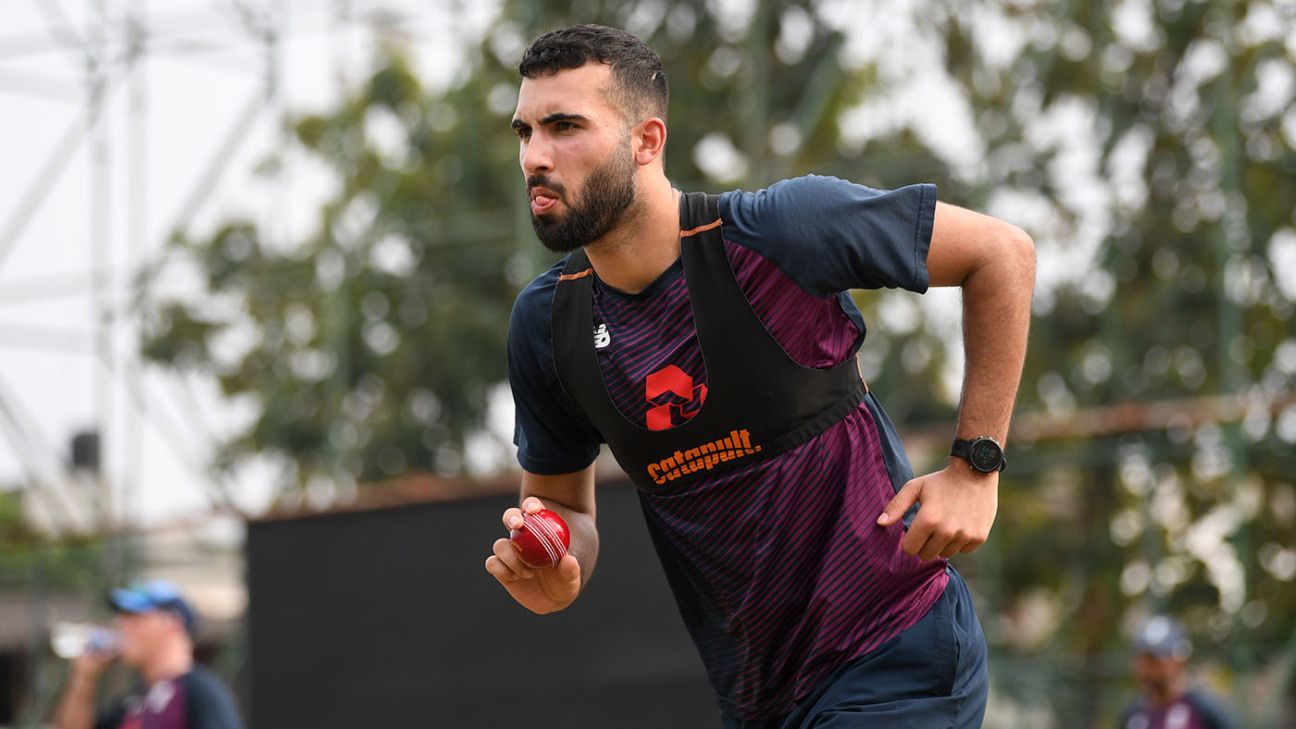Saqib Mahmood thinks that reverse-swing will come into play in England’s home Tests this summer, with the ICC’s saliva ban forcing seamers to find alternatives to conventional swing.
Mahmood is in line for a Test debut at some stage this summer, with a packed revised schedule likely to force England to rotate their pace attack, and has been back training at Emirates Old Trafford over the past two weeks.
And while he has found it difficult to adjust to not shining the ball as he is used to – “it’s almost second nature” – Mahmood thinks that a combination of hot weather, dry pitches and the ban on saliva could see bowlers use different methods to get the ball moving.
ALSO READ: Closed doors could bring opportunities for England’s fringe players – Mo Bobat
“It’s not ideal. As bowlers, especially swing bowlers, you lose one of your biggest threats,” Mahmood told ESPNcricinfo. “You want to start practising new skills, but it does take a big weapon away from bowlers and that will favour the batsmen a lot more.
“If you’re playing on an abrasive or dry surface, which Old Trafford and Southampton [the venues for the West Indies series] can be, then you might use [reverse-swing] as a tactic. Rather than shining the ball and getting it to swing conventionally, you might scuff up one side on the wicket and try to look after the other to get it smooth and dry to get lateral movement.
“The wickets I’ve been training on have been fairly green, but once I get up to 100% fitness, I think I’ll start practising that. That’ll come into play over the next couple of weeks.”
Mahmood worked closely with Darren Gough, employed as a bowling consultant by the ECB, on England’s tour of New Zealand this winter, and has a Kookaburra ball at home that Gough gave him which he uses to practise reverse-swing.
And while he has rarely tried to hone the skill in England, he expects that it will come into play over the coming weeks.
“It’s almost like my point of difference, which is why I have to practise it and try to get it as good as possible. It’s something you want to practise to get good at, both to bowl teams out overseas and potentially, with how things are looking, at home as well this year.
“In England, you don’t really practise reverse-swing, and not everyone can do it. Last year, we had one game at Old Trafford at the back end of the season where the ball was reversing in my spell after tea, and while it felt good when I got it right, it took me a while.
“That’s what I’ve been practising this winter: trying to get it to feel right from ball one or two of the spell, rather than wasting two or three overs and then getting it right. That’s been the biggest difference.”
While Mahmood’s ability to get the ball reversing is perhaps the main reason that he has many admirers within the England set-up, his pace is also an important factor. He has regularly been clocked at 87-88mph in televised games, and thinks that the ball is coming out faster than usual since his return to training.
That increase in speed is little surprise after he decided to set himself physical targets during lockdown, kitting his garage out to turn it into a home gym and “solely focusing on strength” for the first time that he can remember.
“I’ve been able to build up pretty quickly. I’ve obviously not hit match intensity yet, but in terms of the feel of my run-up and action, and the rhythm that I’ve been able to get into, I thought it would take me a lot longer.
“There was that uncertainty of how long lockdown was going to be, and I wanted to make the most of it. I had everything I needed for leg strength, core stuff, upper-body stuff and I feel the difference in my body now. I don’t know if that’s added any pace, but so far it feels like it is coming out quicker than what it was, which is good.”
ALSO READ: Bravo, Hetmyer, Paul turn down call-ups for England series
Training remains a strict environment with regards health protocols, and Mahmood is yet to bowl to a batsman since returning, but after the ECB were given the green light to move onto ‘stage two’ training, it has become less of a solitary experience. Mahmood has been able to train at the same time as James Anderson with Glen Chapple, Lancashire’s head coach, on hand for technical advice.
But there won’t be too much of an opportunity to settle into a routine. When West Indies arrive in England next week, they are due to spend the first three weeks of their tour at Old Trafford. As a result, Lancashire will move their training base to Chester Boughton Hall, meaning a longer commute for Mahmood.
“Old Trafford becomes off-limits for us, and I’ll just have to crack on with it. It’s about building everything up and getting as close to match-ready as possible now. As individuals, it’s a case of not putting too much pressure on ourselves to be perfect and making the most of it.”
